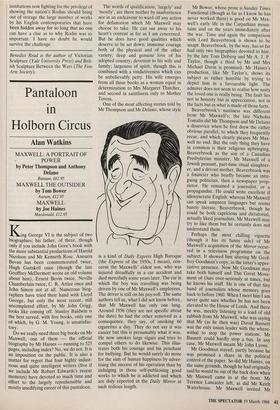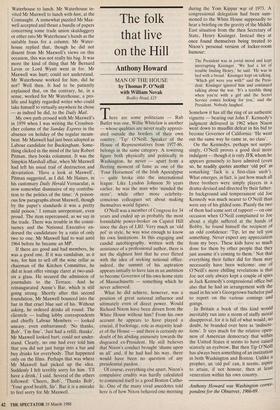Pantaloon in Holborn Circus
Alan Watkins
MAXWELL: A PORTRAIT OF POWER• by Peter Thompson and Anthony Delano
Bantam, £2.95
MAXWELL THE OUTSIDER by Tom Bower
Aurum, £12.95
MAXWELL by Joe Haines
Macdonald, £12.95
King George VI is the subject of two biographies; his father, of three, though only if you include John Gore's book with the more substantial productions of Harold Nicolson and Mr Kenneth Rose. Aneurin Bevan has been commemorated twice, Hugh Gaitskell once (though the late Geoffrey McDermott wrote an old volume about him), Ernest Bevin twice, Neville Chamberlain twice, C. R. Attlee once and John Simon not at all. Numerous biog- raphers have tried their hand with Lloyd George, but only the most recent, still uncompleted effort, by Mr John Grigg, looks like coming off. Stanley Baldwin is the best served, with five books, only one of which, by G. M. Young, is unsatisfac- tory. Do we really need three big books on Mr Maxwell, one of them — the official biography by Mr Haines — running to 525 pages, including index? No, we do not. It is an imposition on the public. It is also a matter for regret that four highly indust- rious and quite intelligent writers (five if we include Mr Robert Edwards's recent memoirs) have devoted so much time and effort to the largely reprehensible and mostly unedifying career of this pantaloon. The words of qualification, 'largely' and `mostly', are there neither by inadvertence nor in an endeavour to ward off any action for defamation which Mr Maxwell may choose to take. He can sue away to his heart's content as far as I am concerned. But he does have good qualities which deserve to be set down: immense courage both of the physical and of the other variety; deep and genuine love of his adopted country; devotion to his wife and family; largeness of spirit, though this is combined with a vindictiveness which can be unbelievably petty. His wife emerges from all three books as a woman equal in determination to Mrs Margaret Thatcher, and second in saintliness only to Mother Teresa.
One of the most affecting stories told by Mr Thompson and Mr Delano, whose style is a kind of Daily Express High Baroque (the Express of the 1950s, I mean), con- cerns the Maxwells' eldest son, who was injured dreadfully in a car accident and died mercifully some years later. The car in which the boy was travelling was being driven by one of Mr Maxwell's employees. The driver is still on his pay-roll. The same authors tell us, what I did not know before, that Mr Maxwell has only one lung. Around 1956 (they are not specific about the date) he had the other removed as a consequence, they say, of smoking 60 cigarettes a day. They do not say it was cancer but this is presumably what it was. He now smokes large cigars and tries to compel others to do likewise. This illus- trates both his courage and his penchant for bullying. But he would surely do more for the sum of human happiness by adver- tising the success of his operation than by indulging in those self-publicising good works to which he is addicted and which are duly reported in the Daily Mirror at such tedious length. Mr Bower, whose prose is Sunday Times Functional (though as far as I know he has never worked there) is good on Mr Max- well's early life in the Carpathian moun- tains and on the years immediately after the war. Time and again the comparison with Lord Beaverbrook is shown to be unapt. Beaverbrook, by the way, has so far had only two biographies devoted to him, by the late Tom Driberg and Mr A. J. P. Taylor, though a third by Mr and Mrs Michael Davie is promised. Mr Haines's production, like Mr Taylor's, shows its subject as rather horrible by trying to depict him in a favourable light. The admirer does not seem to realise how nasty the loved one is really being. The fault lies not in honesty but in appreciation, not in the facts but in what is made of those facts.
Beaverbrook's nastiness was different from Mr Maxwell's; the late Nicholas Tomalin did Mr Thompson and Mr Delano a disservice when he first drew the rather obvious parallel, to which they frequently recur, and which clearly pleases Mr Max- well no end. But the only thing they have in common is their religious upbringing, Beaverbrook as the son of a Canadian Presbyterian minister, Mr Maxwell of a Jewish peasant, part-time ritual slaughter- er, and a devout mother. Beaverbrook was a financier who briefly became an intri- guing politician, then a newspaper prop- rietor. He remained a journalist, or a propagandist. He could write excellent if idiosyncratic English, whereas Mr Maxwell can speak umpteen languages but seems barely literate. Beaverbrook, though he could be both capricious and dictatorial, actually liked journalists. Mr Maxwell may try to like them but he certainly does not understand them.
Perhaps the most chilling vignette (though it has its funny side) of Mr Maxwell's acquisition of the Mirror occur- red in a television programme on the subject. It showed him altering Mr Geof- frey Goodman's copy, in the latter's appre- ciative presence. Now Mr Goodman may take both himself and This Great Move- ment of Ours over-seriously at times, but he knows his stuff. He is one of that tiny band of journalists whose memory goes back to before 1960. When I meet him I am never quite sure whether he has not been elevated to the House of Lords. And there he was, meekly listening to a load of old rubbish from Mr Maxwell, who was saying that Mr (as he then was) David Basnett was the only union leader with the where- withal to stop the power stations. Mr Basnett could hardly stop a bus. In any case, Mr Maxwell meant Mr John Lyons, Mr Goodman stayed, partly because he was promised a share in the political control of the paper. So did Mr Haines, on the same grounds, though he had originally said he would be out of the back door when Mr Maxwell came in at the front. Mr Terence Lancaster left, as did Mr Keith Waterhouse. Mr Maxwell invited Mr Waterhouse to lunch. Mr Waterhouse in- vited Mr Maxwell to lunch with him, at the Connaught. A somewhat puzzled Mr Max- well accepted and thrust a bundle of papers concerning some trade union skulduggery or other into Mr Waterhouse's hands as the suitable basis for a column. Mr Water- house replied that, though he did not dissent from Mr Maxwell's views on this occasion, this was not really his bag. It was more the kind of thing that Mr Bernard Levin or Lord Wyatt went in for. Mr Maxwell was hurt; could not understand. Mr Waterhouse worked for him, did he not? Well then. It had to be patiently explained that, on the contrary, he, in a sense, worked for Mr Waterhouse, a pro- lific and highly regarded writer who could take himself to virtually anywhere he chose — as indeed he did, to the Daily Mail.
My own path crossed with Mr Maxwell's in 1959 when I was writing the Crossben- cher column of the Sunday Express in the absence on holiday of the regular incum- bent. Mr Maxwell had just been adopted as Labour candidate for Buckingham. Some- thing clicked in the mind of the late Robert Pitman, then books columnist. It was the Simpkin Marshall affair, when Mr Maxwell had left his usual trail of destruction and devastation. 'Have a look at Maxwell', Pitman suggested, as I did. Mr Haines, in his customary Daily Herald Vernacular, is now somewhat dismissive of my contribu- tion to the politics of the time: 'A poison- ous few paragraphs about Maxwell, though by the paper's standards it was a pretty mild poison.' I remain unrepentant, even proud. The item repercussed, as we say in the trade. There was trouble in the consti- tuency and the National Executive en- dorsed the candidature by a ratio of only two to one. Mr Maxwell had to wait until 1964 before he became an MP.
If there are good and bad members, he was a good one. If it was vandalism, as it was, for him to sell off the wine cellar as chairman of the Kitchen Committee, he did at least offer vintage claret at two-and- six a glass. He secured the admission of journalists to the Terrace. And he reinaugurated Annie's Bar, which is still going strong. Shortly after this second foundation, Mr Maxwell bounced into the bar in that cruel blue suit of his. Without asking, he ordered drinks all round. The clientele — loafing lobby correspondents and chiefly Labour Members — looked uneasy, even embarrassed: 'No thanks, Bob', 'I'm fine', 'Just had a refill, thanks'. Mr Maxwell looked hurt; could not under- stand. Clearly, no one had ever told him that you did not just barge into a bar and buy drinks for everybody. That happened only on the films. Perhaps that was where Mr Maxwell had picked up the idea. Suddenly I felt terribly sorry for him. 'I'll have a drink,' I said. Several of the others followed: 'Cheers, Bob', 'Thanks Bob', `Your good health, Sir'. But it is a mistake to feel sorry for Mr Maxwell.

























































 Previous page
Previous page